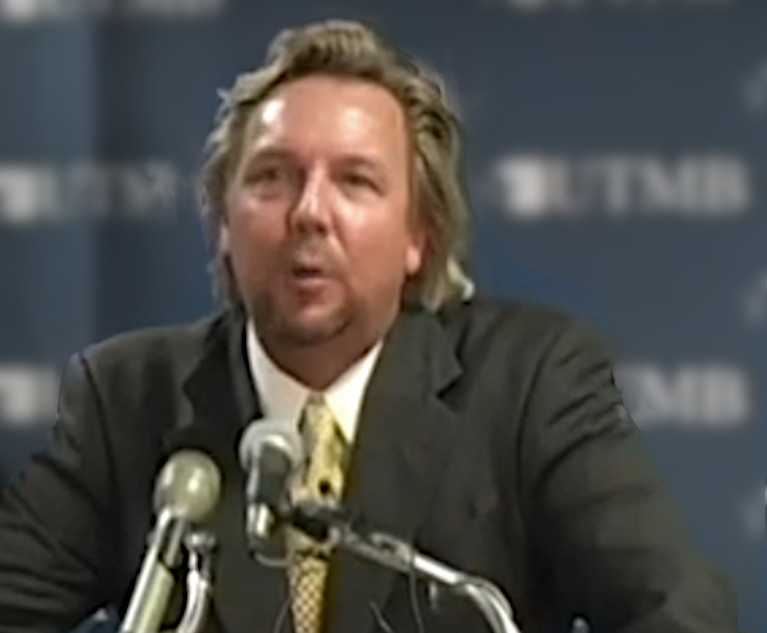Government Offers Storage at the Strategic Petroleum Reserves for US-Produced Crude Oil
Similar to the previous RFP for SPR purchases, this RFP is restricted for storage of U.S.-produced crude but the limitation on the producer size has been eliminated. As with the previous RFP, it is important for bidders to be aware of the additional risks related to certifications and compliance measures required of companies contracting with the government.
April 23, 2020 at 07:50 PM
6 minute read
 (L-R): Monica Hwang, Chelsea Vernon and Rick Vacura of King & Spalding.
(L-R): Monica Hwang, Chelsea Vernon and Rick Vacura of King & Spalding.
On March 13, President Donald Trump announced he had directed the U.S. Department of Energy (DOE) to begin purchasing oil for the Strategic Petroleum Reserves (SPR). The DOE immediately took action March 19 by issuing a request for proposal (RFP) for 30 million barrels of crude oil. However, this plan was scrapped after the DOE failed to secure funding as part of the CARES Act stimulus bill signed in March.
As an alternative, on April 2, the Trump administration announced the DOE would instead lease space within the SPR to private companies. Following this announcement, the DOE released an RFP to provide crude oil storage for 30,000,000 barrels through time exchanges. All submissions for this RFP must be received no later than 11 a.m. CST April 9. Based on the foregoing, further RFPs are expected in the coming months with the DOE projected to lease storage for a further 47 million barrels of crude oil produced in the United States.
Similar to the previous RFP for SPR purchases, this RFP is restricted for storage of U.S.-produced crude but the limitation on the producer size has been eliminated. As with the previous RFP, it is important for bidders to be aware of the additional risks related to certifications and compliance measures required of companies contracting with the government.
Overview of the SPR
It is worth reiterating the background of the SPR, which was created as an emergency supply of crude oil in the 1970s following the 1973–1974 oil embargo. Its purpose is to reduce the impact of disruptions to the U.S. supply of oil in the event of other oil embargos, natural disasters, etc. It is also fundamental to the U.S. for meeting its International Energy Agency obligations, which requires member countries to maintain a supply of emergency oil stocks. The SPR is the world's largest supply of emergency crude oil with an authorized capacity of 713.5 million barrels and is stored in underground salt caverns along the U.S. gulf coast at four sites—two in Texas and two in Louisiana.
It appears that this is the first time the DOE has ever leased storage space in the SPR to private companies. In 2018 the House of Representatives attempted to permit the DOE to lease space in the SPR to private companies; however, the bill the House of Representatives passed was never taken up by the Senate. Recently, the DOE has announced it would lease storage space in the SPR to the Australian government to store that country's strategic reserves.
Overview of the RFP
The RFP is targeted at "crude oil produced in the United States for fulfillment purposes." The bidder, however, can be a regular crude seller or distributor so long as it provides certification that the crude oil is supplied by U.S. entities, which are defined as individuals, corporations, partnerships or governmental entities and which are U.S. citizens, incorporated or organized in the U.S. or governmental entities of the U.S. or one of its states. Thus, qualifying U.S. producers can participate indirectly with a trader or major producer acting as the aggregator. This RFP does not have the size limitation for U.S. producers that was in the RFP for SPR purchases (i.e., requiring that qualifying U.S. producers are those with less than 5,000 employees). Because the crude oil is sourced domestically, even marine deliveries must be made by U.S.-flagged vessels pursuant to the Jones Act.
The delivery period to the SPR is for the months of May and June 2020, and such crude oil must be withdrawn by the winning bidders by March 31, 2021. Each award is capped at 5 million barrels, and each bidder is limited to a maximum award of 10 million barrels. Thus, a minimum of six awards may be expected. Bidders will propose the monthly fixed exchange ratio, which is the ratio of barrels to be retained by the DOE and deducted from the quantity to be returned to the winning bidder in the second leg of the exchange. The ratio will be applied to the maximum storage and exchange capacity awarded (and not the inventory balance) to determine the quantity to be retained by the DOE, and bids will be evaluated primarily on the best barrel exchange ratio offered.
Compliance Requirements
Because the government as a contracting party operates under extensive and complex procurement statutes, regulations and rules that are different than the commercial marketplace, contracting with the government as a prime or subcontractor may pose significant financial risks, and even may result in administrative sanctions, or civil and criminal liability for noncompliance. For example, all potential bidders must register in the System for Award Management (SAM) and provide representations and certifications that are unique to doing business with the government and are made under penalty of the False Statements Act, 18 U.S.C. 1001. In addition, the requirements listed in the RFP cover 11 pages of Federal Acquisition Regulation (FAR) and FAR-like clauses, some of which are incorporated by reference.
The one-week time period (April 2-9) to prepare and submit a bid for the RFP may be a challenge for companies unfamiliar with the required procedures and regulations involved. Companies that regularly contract with the government mitigate the risk by having well-developed internal systems and processes to ensure compliance with these government-unique requirements. Potential bidders to the RFP and producers that may supply the crude to such bidders would be well served to make sure they understand how their current compliance policies and procedures may need to be enhanced to mitigate the risk when contracting with the government.
Takeaway
The RFP targeted at crude oil produced in the U.S. has likely piqued the interest of U.S. producers and crude traders seeking ways to store crude in the current low price environment. For bidders seeking to contract with the U.S. government for the first time, understanding the additional regulatory requirements to contract with the government is important to mitigate the risks related to government-unique compliance requirements and to improve a bidder's chance of preparing a winning bid. A potential bidder to this RFP would be well advised to engage legal counsel early in the process to navigate regulatory compliance matters.
Monica Hwang, a partner in King & Spalding's Houston office, focuses her practice on advising clients on the development of energy infrastructure projects, complex joint venture in the energy space and complex commercial transactions. She can be reached at [email protected].
Rick Vacura is a partner in the firm's special matters and government investigations team in Washington, D.C., and head of the government contracts practice. He can be reached at [email protected].
Chelsea Vernon is an associate in the corporate, finance and investments practice group of the firm's Houston office. She can be reached at [email protected].
This content has been archived. It is available through our partners, LexisNexis® and Bloomberg Law.
To view this content, please continue to their sites.
Not a Lexis Subscriber?
Subscribe Now
Not a Bloomberg Law Subscriber?
Subscribe Now
NOT FOR REPRINT
© 2025 ALM Global, LLC, All Rights Reserved. Request academic re-use from www.copyright.com. All other uses, submit a request to [email protected]. For more information visit Asset & Logo Licensing.
You Might Like
View All
Holland & Knight Hires Former Davis Wright Tremaine Managing Partner in Seattle
3 minute read

Newsmakers: Former Pioneer Natural Resources Counsel Joins Bracewell’s Dallas Office
Law Firms Mentioned
Trending Stories
- 1New York-Based Skadden Team Joins White & Case Group in Mexico City for Citigroup Demerger
- 2No Two Wildfires Alike: Lawyers Take Different Legal Strategies in California
- 3Poop-Themed Dog Toy OK as Parody, but Still Tarnished Jack Daniel’s Brand, Court Says
- 4Meet the New President of NY's Association of Trial Court Jurists
- 5Lawyers' Phones Are Ringing: What Should Employers Do If ICE Raids Their Business?
Who Got The Work
J. Brugh Lower of Gibbons has entered an appearance for industrial equipment supplier Devco Corporation in a pending trademark infringement lawsuit. The suit, accusing the defendant of selling knock-off Graco products, was filed Dec. 18 in New Jersey District Court by Rivkin Radler on behalf of Graco Inc. and Graco Minnesota. The case, assigned to U.S. District Judge Zahid N. Quraishi, is 3:24-cv-11294, Graco Inc. et al v. Devco Corporation.
Who Got The Work
Rebecca Maller-Stein and Kent A. Yalowitz of Arnold & Porter Kaye Scholer have entered their appearances for Hanaco Venture Capital and its executives, Lior Prosor and David Frankel, in a pending securities lawsuit. The action, filed on Dec. 24 in New York Southern District Court by Zell, Aron & Co. on behalf of Goldeneye Advisors, accuses the defendants of negligently and fraudulently managing the plaintiff's $1 million investment. The case, assigned to U.S. District Judge Vernon S. Broderick, is 1:24-cv-09918, Goldeneye Advisors, LLC v. Hanaco Venture Capital, Ltd. et al.
Who Got The Work
Attorneys from A&O Shearman has stepped in as defense counsel for Toronto-Dominion Bank and other defendants in a pending securities class action. The suit, filed Dec. 11 in New York Southern District Court by Bleichmar Fonti & Auld, accuses the defendants of concealing the bank's 'pervasive' deficiencies in regards to its compliance with the Bank Secrecy Act and the quality of its anti-money laundering controls. The case, assigned to U.S. District Judge Arun Subramanian, is 1:24-cv-09445, Gonzalez v. The Toronto-Dominion Bank et al.
Who Got The Work
Crown Castle International, a Pennsylvania company providing shared communications infrastructure, has turned to Luke D. Wolf of Gordon Rees Scully Mansukhani to fend off a pending breach-of-contract lawsuit. The court action, filed Nov. 25 in Michigan Eastern District Court by Hooper Hathaway PC on behalf of The Town Residences LLC, accuses Crown Castle of failing to transfer approximately $30,000 in utility payments from T-Mobile in breach of a roof-top lease and assignment agreement. The case, assigned to U.S. District Judge Susan K. Declercq, is 2:24-cv-13131, The Town Residences LLC v. T-Mobile US, Inc. et al.
Who Got The Work
Wilfred P. Coronato and Daniel M. Schwartz of McCarter & English have stepped in as defense counsel to Electrolux Home Products Inc. in a pending product liability lawsuit. The court action, filed Nov. 26 in New York Eastern District Court by Poulos Lopiccolo PC and Nagel Rice LLP on behalf of David Stern, alleges that the defendant's refrigerators’ drawers and shelving repeatedly break and fall apart within months after purchase. The case, assigned to U.S. District Judge Joan M. Azrack, is 2:24-cv-08204, Stern v. Electrolux Home Products, Inc.
Featured Firms
Law Offices of Gary Martin Hays & Associates, P.C.
(470) 294-1674
Law Offices of Mark E. Salomone
(857) 444-6468
Smith & Hassler
(713) 739-1250







